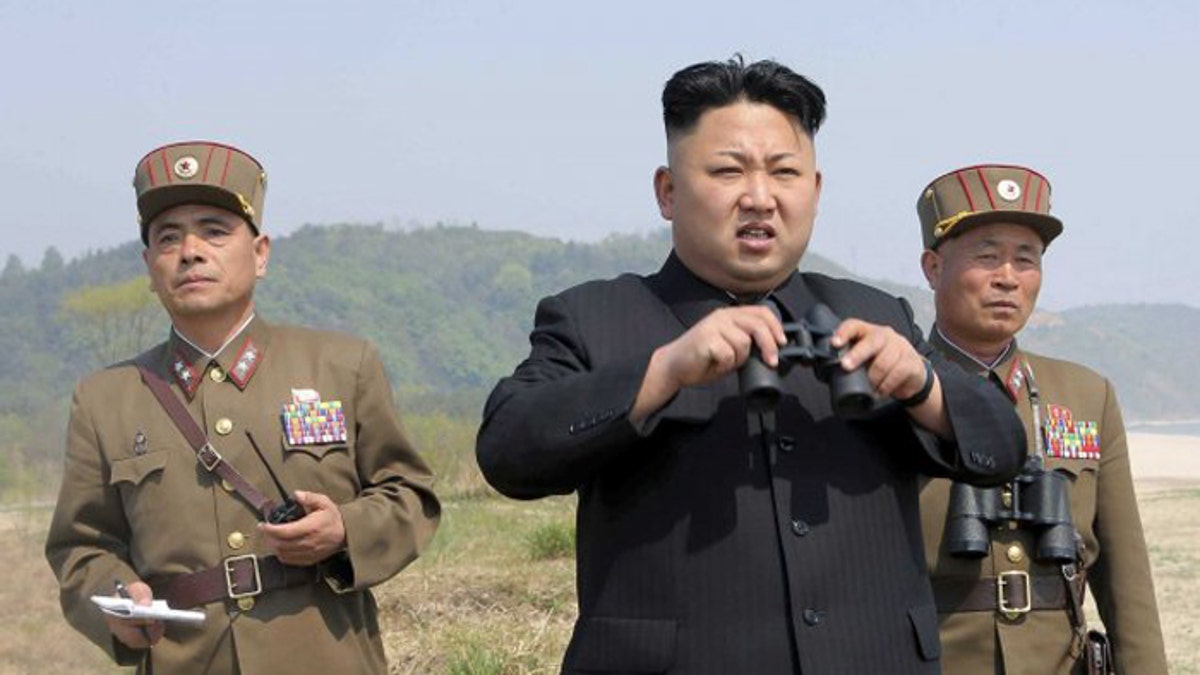
Some nerve: North Korean dictator Kim Jong Un's repressive regime is criticizing the CIA for its enhanced interrogation tactics. (Reuters)
It’s one thing for the U.S. to face wagging fingers from human rights groups over a Senate report alleging the CIA tortured suspected terrorists in the wake of 9/11, but critics say nations including China, Iran and North Korea have no right to pile on given their own long and sordid histories of abuses.
In North Korea, where millions of people are starving and untold thousands languish in work camps, the state-run media went as far as to connect the CIA actions to two racially-charged incidents in which unarmed black men were killed in confrontations with police.
"Why the UN Security Council is turning its face from the inhuman torture practiced by the CIA over which the UN anti-torture committee expressed particular concern and which is dealt with in the 6,000-page-long report presented by the intelligence committee of the U.S. Senate, and such despicable human rights abuses as white American policemen’s brutalities of shooting and strangling black men to death," a Pyongyang-run media commentary railed.
[pullquote]
The Senate Intelligence Committee’s $40 million report, five years in the making and finally released Tuesday amid criticism from Republicans and the intelligence community, alleges CIA operatives used enhanced interrogation techniques “that at times amounted to torture” against suspected terrorists. While proponents of the report’s release say it shows America owns up to its sins, critics dispute claims of torture and say the interrogation efforts saved lives. They warn that releasing the report could inflame Muslims and put Americans around the world at risk.
Regardless of the debate happening in the U.S., North Korea is not qualified to chastise anyone about torture, said Marion Smith, executive director of the Victims of Communism Memorial Foundation.
“This is a huge irony,” Smith said. “North Korea is a giant prison where mass starvation is happening. It is an insane regime where there is no respect for human rights, and it is patently absurd that they would take this opportunity to criticize the U.S.”
Mike Baker, a former CIA covert operations officer and currently president of the global intelligence and security firm Diligence, said the report was biased and noted it did not even include interviews with the people who carried out the intelligence gathering operation in the wake of 9/11.
"This leaves us with a propaganda piece that is a very useful tool not only for North Korea and other hostile nations, but more dangerously, for the Muslim extremists of ISIS and Al Qaeda who will use this to enhance their recruitment and propaganda efforts and to attempt to entice their supporters into violence," Baker said.
North Korea’s sentiments were echoed by a rogue’s gallery of the world’s most thuggish regimes, suddenly weighing in on the side of human rights.
"China has consistently opposed torture,” said Hong Lei, spokesman for China’s foreign ministry. “We believe that the U.S. side should reflect on this, correct its ways and earnestly respect and follow the rules of related international conventions."
Russia’s Foreign Ministry's rights envoy, Konstantin Dolgov, said Thursday that the evidence contained in the report proves “flagrant and systemic rights abuse” and "contradict[s] the U.S. aspirations to serve as a model of democracy."
In the Middle East, Iran’s Supreme Leader Ali Khamenei, tweeted that the report was “shameful” and the foreign minister in Turkey, where human rights watchdogs have expressed alarm at the accelerating erosion of freedoms, condemned the acts in the report as “unacceptable” for which there “can be no excuse.”
Top United Nations officials, including Special Rapporteur on Torture Juan Méndez, have called for U.S. officials to be prosecuted for the activities outlined in the report.
“I travel to parts of the world in my capacity of United Nations special rapporteur on torture, and I can attest to the fact that many states either implicitly or explicitly tell you: ‘Why look at us? If the U.S. tortures, why can’t we do it?’” Mendez said.
The criticism coming in from repressive regimes demonstrates how the Senate report undermined America's ability to speak out against regimes that torture their own citizens, said John Sifton, of Human Rights Watch.
"The Senate report makes it easier for loathsome foreign regimes to criticize the United States' human rights record, which drives home another key reason why the CIA's abuses need to be thoroughly renounced," Sifton told FoxNews.com. "This makes it all theeasier for abusive governments worldwide to criticize the U.S. while brushing their own abuses under the rug. It also makes it difficult for the U.S. government to criticize those abusive governments and pressure them to improve their record."








































